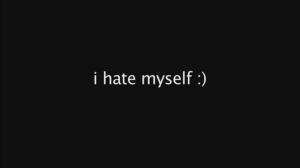
 title card.
title card.Written by Erin Tatum.
Many people don’t like to watch documentaries. We crave rational narratives and a steadily progressing plot with climax and resolution. Traditional cinema also sets highly unrealistic expectations of romance for the audience, to the point where it’s become almost mandatory for characters to suspend all reality in favor of a whirlwind love story. Filmmaker Joanna Arnow consciously undercuts these desires and takes great care to deny us a comfortable, comprehensible narrative. The problem is she doesn’t do much else. i hate myself  chronicles Arnow’s relationship with “racially charged poet-provocateur” James Kepple (her description, not mine). The purpose of the documentary is allegedly for Arnow to determine for herself and her friends whether or not James is boyfriend material.
chronicles Arnow’s relationship with “racially charged poet-provocateur” James Kepple (her description, not mine). The purpose of the documentary is allegedly for Arnow to determine for herself and her friends whether or not James is boyfriend material.
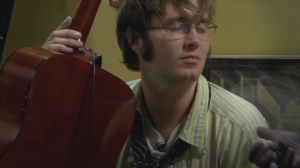
i hate myself  feels as vapid and self-absorbed as an episode of Girls adapted into a college screenplay. Arnow is clearly sipping a bit too much of the Lena Dunham koolaid. Namely, we get to watch an entitled white girl from Brooklyn create her own problems and passively refuse to seize any agency because her “struggle” (which is deliberately never outside of her control) is artistic. James essentially exists to make anyone with an invested interest in equality want to light themselves on fire. He is unapologetically misogynistic and racist to an astronomical degree. He’s a caricature of every 4chan and Reddit troll, right down to the fedora. To top it all off, he has a drinking problem and spends the vast majority of his time on camera drunk or indignant or both.
feels as vapid and self-absorbed as an episode of Girls adapted into a college screenplay. Arnow is clearly sipping a bit too much of the Lena Dunham koolaid. Namely, we get to watch an entitled white girl from Brooklyn create her own problems and passively refuse to seize any agency because her “struggle” (which is deliberately never outside of her control) is artistic. James essentially exists to make anyone with an invested interest in equality want to light themselves on fire. He is unapologetically misogynistic and racist to an astronomical degree. He’s a caricature of every 4chan and Reddit troll, right down to the fedora. To top it all off, he has a drinking problem and spends the vast majority of his time on camera drunk or indignant or both.
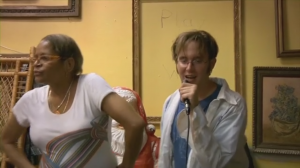
Making matters worse, Arnow just doesn’t seem to care about anything other than making the film. Her dynamic with James initially appears to be your run-of-the-mill plain Jane selling herself short because of low self-esteem and longing for the wild side of life. By the end, you have no sympathy for her and she winds up looking almost as smarmy as James. According to the live Q&A after the screening, it was Arnow’s intention to highlight that she wasn’t a victim and was complicit in some of the problematic aspects of their relationship. She totters after James with her camera as he frequents the Harlem poetry slam scene, dropping the N-word every 90 seconds and adamantly insisting to every person of color within hearing distance that his knowledge of racial politics is superior to theirs. She does nothing to intervene, forcing us to sit through scene after scene of his delusional, inflammatory diatribes and doubtlessly stroking his ego. There is a difference between having flaws and allowing your partner to shit all over a minority in their own community repeatedly to make yourself seem profound. It’s shock value, but at the expense of whom? Arnow would like to have you believe that she nobly sacrificed her own integrity at the stake of gritty realism, but what about all those people who just wanted to hear some goddamn poetry and were instead assaulted by two white kids with a superiority complex?
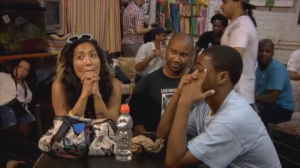
The premise of the film is paperthin to start with and deteriorates even further as it becomes increasingly clear that Arnow is simply using the documentary as an elaborate way to thumb her nose at anyone she believes couldn’t possibly understand the complexity of her precious psyche…so conveniently pretty much anyone but her. Her family and friends reiterate numerous times that they think James is a terrible person and she should not be dating him. Some of her friends go as far as calling her out on using the relationship as purposeful self-sabotage to satisfy her need for drama and attention. I think we all have friends like Arnow who are exhausting to be around because they’re compulsively addicted to making every platonic and romantic relationship one big protracted ego wank. Arnow’s fixation on validating her own self-importance goes as far as bullying her parents into watching her sex scene with James during the screening of the final product. It was never about James. It’s about proving that she’s important enough both to associate with someone as exciting as him and to anger her loved ones by pissing away her potential and self-respect by association with this douche.
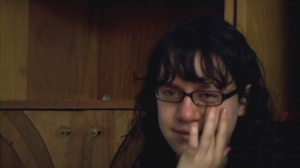
There is one thing that Arnow has in common with James – she really fucking hates the mainstream. Throughout the film, she references not wanting to conform to societal norms and complains that everyone’s disapproval stems from a collective brainwashing scheme to make her like everybody else. She echoed a similar contempt for coming-of-age narratives in the Q&A, saying that she didn’t find it realistic to have a protagonist grow up and have their lives together by learning a clichéd life lesson in the end. I totally agree with that. I think coming-of-age stories are incredibly boring and send the wrong message about what adulthood and maturity is supposed to be. However, there is a fine line between subverting pre-established scripts and just meandering aimlessly with zero narrative. Although it may seem unfair that I’m dumping most of the blame on Arnow, she herself acknowledges that most people will find James revolting. Since she seems to have deliberately featured him to get a rise out of the audience, I’m not going to waste any more of my time by exhaustively enumerating the ways that he is the world’s biggest piece of shit because frankly I don’t want to give either of them the satisfaction. The most troubling thing to me is that Arnow thinks her story in itself is a philosophical commentary on the human experience that others can learn from when really it’s pure self-indulgence. Any possible sympathetic resonance that viewers who have also found themselves in unhealthy relationships might feel completely evaporates under the weight of her stubborn apathy.
An unlikely voice of wisdom comes from Arnow’s editor and apparent nudism enthusiast Max Karson, who does not put on a single piece of clothing for any of his scenes. I’m assuming that this was another quirky indie decision for lols, but I do admire his don’t-give-a-fuck attitude. I just wish everyone and everything in this movie would stop trying so hard to be offkilter. Anyway, Max spends most of his screen time picking on Arnow and criticizing her personal life choices with very little sugarcoating. You almost wonder why they’re friends. Tellingly, whenever he tries to weasel a definitive opinion on her life or relationship out of her that would admit even the tiniest shred of culpability, she becomes as inarticulate as a bashful kindergartner. At one point he observes, “I think you’re so ashamed of yourself that you manipulate other people into saying what you want to say because you can’t take responsibility for anything.” Way to hit the nail on the head, buddy. Needless to say, Max is the character that I identify most with.
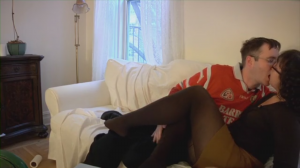
In the end, Arnow actually shows the finished product to James. To give you an idea of just how shapeless this film is, when he asks her why she included the sex scene, she giggles and says “because it’s porn!” Like many things in her work, I call bullshit here. You’re the director. You know you consciously chose everything for a reason. Her childish disavowal of any coherent explanation for anything redefines grating. I know her aim is to be defiantly immature, but taken to this ludicrous extreme, it dilutes the impact of the film significantly. To James’ credit, he is disgusted to find out that she forced her parents to watch the sex scene and calls her a sadist. You know if James says you have issues, you’re fucked. They start having sex for no reason and stagger off camera before it finally cuts to black.
The title of the film really speaks to all its issues. The lowercase and the emoticon evoke teen angst and suggest a digital form of communication, alluding to the disconnect that many young people feel between themselves and society and reality. The film’s fatal flaw is not that Arnow failed to grow and progress, but rather that she wasn’t even a primary player in her own story and actively worked to dismantle accountability for any of her life choices by unfairly shifting blame onto people who were trying to support her. You can’t pretend other people are puppeteering your life when you’re the one behind the camera.
Arnow may hate herself, but I really just don’t care.
